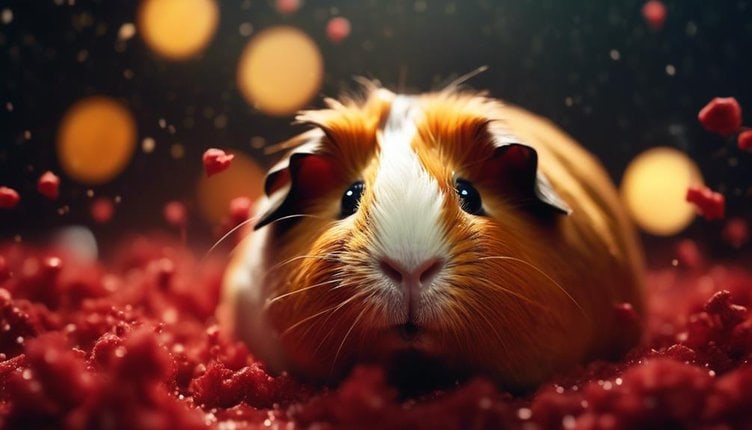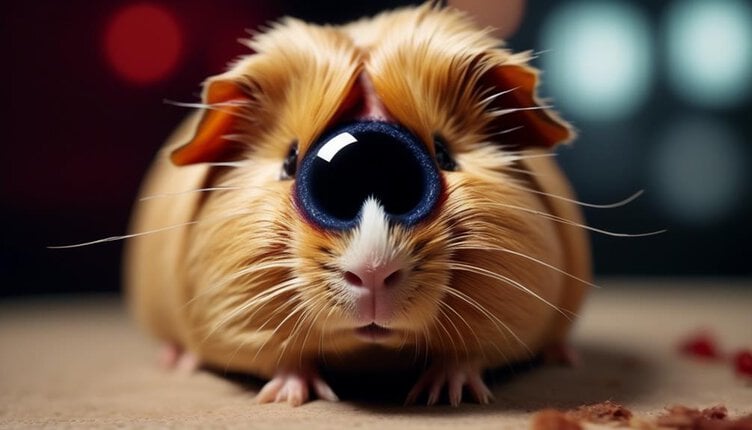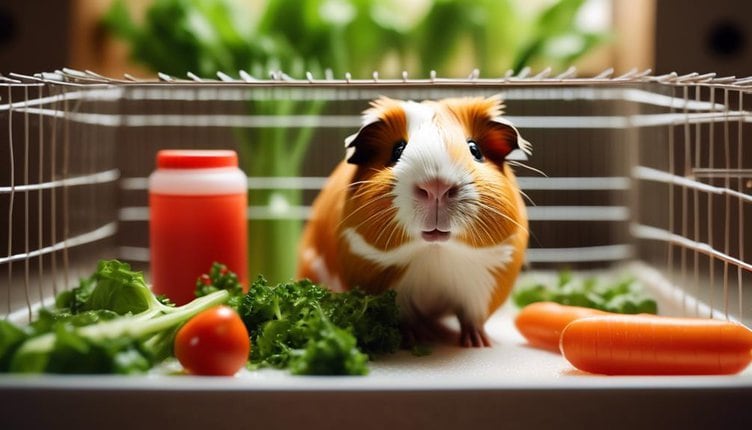Hey there, folks! So, picture this: Mr. Johnson is going about his business, cleaning up his guinea pig's crib, when he notices something not quite right. His adorable pet, Cocoa, is going to town, rubbing her eyes like crazy. Concerned, Mr. Johnson starts to wonder if Cocoa might be dealing with a case of conjunctivitis.
Now, conjunctivitis, also known as pink eye, is no joke. It's a pretty common eye infection that can really mess with our guinea pig pals. It causes inflammation of the conjunctiva, which is that thin, delicate tissue that covers the white part of the eye and lines the inside of the eyelids. Not fun.
But fear not, my friends! In this article, we're gonna delve into the symptoms and treatment options for conjunctivitis in guinea pigs. We'll dish out some top-notch info to help guinea pig owners, just like Mr. Johnson, handle this situation like champs. Because hey, our little furballs deserve nothing but the best, right?
So stay tuned, folks! We're about to get all the deets on how to tackle conjunctivitis in guinea pigs and keep our furry friends as happy and healthy as can be. Let's do this!
Key Takeaways
- Conjunctivitis in guinea pigs can be caused by viral, bacterial, or allergic factors.
- Infections, irritants, allergies, and trauma can contribute to conjunctivitis in guinea pigs.
- Identifying the specific cause of conjunctivitis is important for effective treatment and prevention.
- Treatment options for conjunctivitis in guinea pigs include antibiotic eye drops, warm compresses, and environmental modifications.
What Is Conjunctivitis?
Conjunctivitis, also known as pink eye, is an inflammation of the conjunctiva, the thin, transparent layer of tissue that covers the white part of the eye and the inner surface of the eyelids. This condition can occur due to various causes and requires appropriate treatment to alleviate symptoms and prevent further complications.
In guinea pigs, conjunctivitis can be caused by viral, bacterial, or allergic factors. Viral conjunctivitis is commonly caused by the herpes simplex virus or adenovirus, while bacterial conjunctivitis is often the result of an infection with bacteria such as Streptococcus or Staphylococcus. Allergic conjunctivitis, on the other hand, is triggered by an allergic reaction to environmental irritants like dust, pollen, or certain substances.
The treatment for conjunctivitis in guinea pigs typically involves addressing the underlying cause. For viral conjunctivitis, supportive care is usually recommended, such as keeping the eyes clean and administering eye drops or ointments to soothe irritation. Bacterial conjunctivitis may require antibiotic treatment to eliminate the infection. Allergic conjunctivitis can be managed by identifying and avoiding allergens, and in some cases, antihistamines may be prescribed to alleviate symptoms.
It is important to seek veterinary advice for an accurate diagnosis and appropriate treatment for guinea pig conjunctivitis. Prompt treatment can help alleviate discomfort and prevent the condition from worsening or spreading to other guinea pigs.
Common Symptoms of Conjunctivitis
When guinea pigs develop conjunctivitis, there are specific symptoms that pet owners should be aware of to identify the condition. Conjunctivitis, also known as pink eye, is an inflammation of the conjunctiva, the thin membrane that covers the white part of the eye and lines the inner surface of the eyelids. The most common symptoms of conjunctivitis in guinea pigs include redness, swelling, discharge, and squinting of the affected eye. Additionally, guinea pigs may exhibit signs of discomfort, such as scratching or rubbing the eye, and may appear lethargic or have a decreased appetite.
To provide a visual representation of the common symptoms of conjunctivitis in guinea pigs, a table is included below:
| Symptom | Description |
|---|---|
| Redness | The affected eye appears redder than usual. |
| Swelling | The area around the eye may be swollen or puffy. |
| Discharge | A thick, sticky discharge may be present, causing crustiness around the eye. |
| Squinting | The guinea pig may keep the affected eye partially closed. |
| Scratching/Rubbing | The guinea pig may scratch or rub the affected eye with its paws or against objects. |
| Lethargy/Decreased Appetite | The guinea pig may show signs of lethargy or a decreased interest in food. |
To prevent conjunctivitis in guinea pigs, it is important to maintain good hygiene and provide a clean environment for the pet. Regularly cleaning the cage, avoiding exposure to irritants, and ensuring proper nutrition can help reduce the risk of conjunctivitis. If conjunctivitis is suspected, immediate veterinary attention is necessary. Treatment options may include antibiotic ointments or drops, warm compresses, and supportive care to alleviate discomfort and promote healing. It is crucial to follow the veterinarian's instructions and complete the full course of treatment to ensure the complete resolution of conjunctivitis in guinea pigs.
Causes of Conjunctivitis in Guinea Pigs

Conjunctivitis in guinea pigs can have various causes, including infections, irritants, allergies, and environmental factors.
Infections can be bacterial, viral, or fungal, and can result from poor hygiene or exposure to contaminated environments.
Irritants such as dust, smoke, or chemicals can also trigger conjunctivitis in guinea pigs.
Additionally, allergies to certain substances or environmental factors like pollen or hay can lead to inflammation of the conjunctiva.
It's important for guinea pig owners to identify the specific cause in order to provide appropriate treatment and prevent recurrence.
Common Causes of Conjunctivitis
One of the most common causes of conjunctivitis in guinea pigs is bacterial infection. Bacteria such as Staphylococcus aureus and Streptococcus pneumoniae can invade the eyes, leading to inflammation and infection of the conjunctiva.
Viral infection is another common cause of conjunctivitis in guinea pigs. Viruses like adenovirus and herpesvirus can also cause conjunctivitis in guinea pigs. These infections are often highly contagious and can spread rapidly among guinea pigs in close proximity.
Allergies can also lead to conjunctivitis in guinea pigs. Guinea pigs can develop conjunctivitis as a result of allergies to certain substances in their environment. Common allergens include dust, pollen, and certain types of bedding. Identifying and removing the allergen is essential in managing and preventing further episodes of conjunctivitis.
Trauma is another cause of conjunctivitis in guinea pigs. Injury to the eye, such as scratches or foreign bodies, can lead to conjunctivitis. It's important to handle guinea pigs gently and ensure that their environment is free from potential hazards.
Understanding the common causes of conjunctivitis in guinea pigs is crucial in providing appropriate treatment and preventing the recurrence of this condition.
Infections and Irritants
Bacterial infections and irritants are prominent factors contributing to conjunctivitis in guinea pigs, necessitating thorough understanding and appropriate management.
Infections, such as those caused by bacteria like Streptococcus or Staphylococcus, can easily enter the guinea pig's eyes through cuts, abrasions, or foreign bodies. These bacteria thrive in warm and moist environments, making the eyes of guinea pigs an ideal breeding ground.
Irritants, on the other hand, can include dust, pollen, smoke, or chemicals found in cleaning products. These substances can cause inflammation and irritation of the conjunctiva, leading to conjunctivitis.
Guinea pigs with poor hygiene, inadequate living conditions, or weakened immune systems are particularly susceptible to these infections and irritants. It's crucial to maintain a clean and safe environment for guinea pigs to prevent the occurrence of conjunctivitis.
Allergies and Environmental Factors
Allergies and environmental factors play a significant role in the development of conjunctivitis in guinea pigs. Guinea pigs can be allergic to certain substances in their environment, such as dust, pollen, or certain types of bedding. These allergens can cause irritation and inflammation of the conjunctiva, leading to the development of conjunctivitis. Additionally, poor ventilation and high levels of humidity can create an environment that's conducive to the growth of bacteria and viruses, increasing the risk of conjunctivitis.
Eye care tips:
- Keep the guinea pig's living area clean and free from dust and allergens.
- Provide proper ventilation to prevent the buildup of bacteria and viruses.
- Use bedding made from hypoallergenic materials to minimize the risk of allergies.
Natural remedies for conjunctivitis in guinea pigs:
- Apply a warm chamomile tea compress to the affected eye to soothe inflammation.
- Use a saline solution to gently clean the eye and remove any discharge.
- Ensure that the guinea pig has a balanced diet rich in vitamin C to support its immune system.
Diagnosing Conjunctivitis in Guinea Pigs

When diagnosing conjunctivitis in guinea pigs, veterinarians carefully examine the symptoms and conduct a thorough ocular examination. Conjunctivitis, also known as pink eye, is characterized by inflammation of the conjunctiva, the thin membrane that covers the inner surface of the eyelids and the white part of the eye. The most common symptoms of conjunctivitis in guinea pigs include redness, swelling, discharge, and excessive tearing of the eyes. These symptoms can be indicative of other eye conditions as well, so it's important for veterinarians to rule out other potential causes through a comprehensive examination.
During the ocular examination, the veterinarian will assess the severity of the conjunctivitis and look for any underlying causes such as allergies, infections, or foreign objects in the eye. They may use a special dye called fluorescein to detect any corneal ulcers or abrasions that may be contributing to the conjunctivitis. Additionally, they may perform a thorough physical examination and take a detailed medical history to identify any potential risk factors or underlying health conditions that may be contributing to the conjunctivitis.
Once a diagnosis of conjunctivitis is confirmed, veterinarians can discuss the appropriate treatment options with the guinea pig owner. These treatment options may include topical antibiotics, anti-inflammatory medications, and supportive care such as warm compresses and gentle cleaning of the eye. It's important for guinea pig owners to follow the veterinarian's instructions carefully and monitor the guinea pig's progress to ensure a successful recovery.
Effective Treatment Options for Conjunctivitis
Treatment options for conjunctivitis in guinea pigs vary depending on the severity of the condition and the underlying causes identified during the veterinary examination. When it comes to effectively treating conjunctivitis in guinea pigs, there are several options available. Here are three important treatment approaches to consider:
- Antibiotic eye drops or ointments: In cases where bacterial infection is the cause of conjunctivitis, the veterinarian may prescribe antibiotic eye drops or ointments. These medications help combat the infection and reduce inflammation in the guinea pig's eyes.
- Warm compresses: Applying warm compresses to the affected eye can help soothe the guinea pig's discomfort and reduce inflammation. It's essential to follow proper technique and use clean, lukewarm water to avoid any further irritation or infection.
- Environmental modifications: In some cases, conjunctivitis may be caused or aggravated by environmental factors such as dust, allergens, or poor ventilation. Making appropriate modifications to the guinea pig's living environment, such as removing potential irritants and ensuring proper ventilation, can aid in the healing process.
While these treatment options are commonly employed, it's crucial to consult a veterinarian before attempting any alternative treatment options or home remedies. They can provide guidance tailored to the specific needs and condition of the guinea pig.
Preventing Conjunctivitis in Guinea Pigs

To prevent conjunctivitis in guinea pigs, it's important to maintain a clean and hygienic living environment. Guinea pig owners should follow proper hygiene practices to ensure the well-being of their pets. Regular cleaning of the cage is essential to prevent the buildup of dirt, dust, and bacteria that can cause conjunctivitis. This includes removing soiled bedding, feces, and uneaten food on a daily basis. The cage should be thoroughly cleaned and disinfected at least once a week.
In addition to cage maintenance, guinea pig owners should practice good hand hygiene before and after handling their pets. This means washing hands with soap and water for at least 20 seconds or using hand sanitizer. Avoid touching your eyes, nose, or mouth while handling your guinea pig to minimize the risk of transmitting any potential pathogens.
It is also important to provide a balanced diet for guinea pigs, as a nutritious diet helps support their immune system and overall health. Ensure that they've access to fresh hay, vegetables, and a high-quality guinea pig pellet food. Avoid feeding them foods that are high in sugar or unhealthy for their digestive system.
When to Seek Veterinary Care for Conjunctivitis
Maintaining proper hygiene and a nutritious diet is crucial for preventing conjunctivitis in guinea pigs, but there are times when veterinary care should be sought to ensure the well-being of the affected animal. It's important to recognize the signs and symptoms of conjunctivitis and seek veterinary care promptly.
Here are three situations in which you should consider seeking veterinary care for conjunctivitis in guinea pigs:
- Persistent or worsening symptoms: If your guinea pig's conjunctivitis symptoms don't improve or worsen despite home treatment, it's time to consult a veterinarian. This could indicate a more serious underlying condition that requires professional attention.
- Severe discharge or swelling: If your guinea pig's eyes have excessive discharge or if there's significant swelling around the eyes, it's crucial to seek veterinary care. These symptoms could be signs of a severe infection or injury that needs immediate attention.
- Changes in behavior or appetite: If your guinea pig shows any changes in behavior, such as lethargy or loss of appetite, along with conjunctivitis symptoms, it's important to consult a veterinarian. These changes could indicate a more systemic issue that requires medical intervention.
Frequently Asked Questions
Can Guinea Pigs Transmit Conjunctivitis to Humans?
Guinea pigs can potentially transmit conjunctivitis to humans, although it is rare. Transmission risks can be minimized through proper hygiene and preventive measures, such as regular handwashing and avoiding direct contact with infected animals.
Are There Any Natural Remedies That Can Be Used to Treat Conjunctivitis in Guinea Pigs?
There are alternative treatments available for conjunctivitis in guinea pigs, such as natural remedies. These remedies can provide relief and help in the healing process. However, it is important to consult a veterinarian for proper diagnosis and guidance.
Can Conjunctivitis in Guinea Pigs Be Prevented Through Vaccination?
Prevention methods for conjunctivitis in guinea pigs include vaccination. The effectiveness of vaccination in preventing the condition may vary. It is important to consult a veterinarian for guidance on the appropriate vaccinations for guinea pigs.
How Long Does It Usually Take for Conjunctivitis in Guinea Pigs to Resolve With Treatment?
The duration of conjunctivitis treatment in guinea pigs varies depending on the severity of the infection and the effectiveness of the prescribed treatment. With proper care and treatment, conjunctivitis can typically resolve within a few days to a couple of weeks.
Are There Any Long-Term Effects or Complications Associated With Conjunctivitis in Guinea Pigs?
Long-term effects and complications of conjunctivitis in guinea pigs can include scarring of the eye, chronic inflammation, and potential vision impairment. Prompt treatment and proper care can help mitigate these risks.




